Any time there's an increase in gas prices you'll often see news stories posing the question: "Is premium fuel worth the premium price?" After the "expert" gives his two cents, the reporter will often conclude thus: "There you have it-if your vehicle runs fine on regular, stop throwing your money away on premium!" The average consumer can easily be lulled to the conclusion that there are no benefits whatsoever from running gasoline that costs a premium price of 20 cents more per gallon. The logic experts use to justify their claims is straightforward: If you run 87 octane and your car doesn't knock or ping, you'll see no difference if you use 89 or 91 octane. There are also claims that if your vehicle is only designed to run on 87 octane, you could possibly encounter problems from using higher octane.
 |
2010 Volkswagen Jetta 2.5L - Proven
|
2010 Volkswagen Jetta 2.5L - Proven
To test the "premium gasoline is a waste of money" theory, we borrowed an unmodified Jetta 2.5L designed to run on 87 octane. In order to get a more accurate read on performance and pick up on any drivability differences, we decided to do more than just dyno tests. We performed the various tests using four tanks of gasoline. Under real-world driving conditions, the tank was run from full to empty first on 87, then on 91, and then back to 87. With the last remnants of 87 the car was dynoed until completely empty, then refilled with 91 and dynoed again.
Vehicle Data
Engine: 2.5-liter I5, dohc, 20-valve
Transmission: Six-speed automatic
Mileage: 4,520
Current modifications: None
Dyno Type:
Six-speed automatic
Baseline : 87 octane
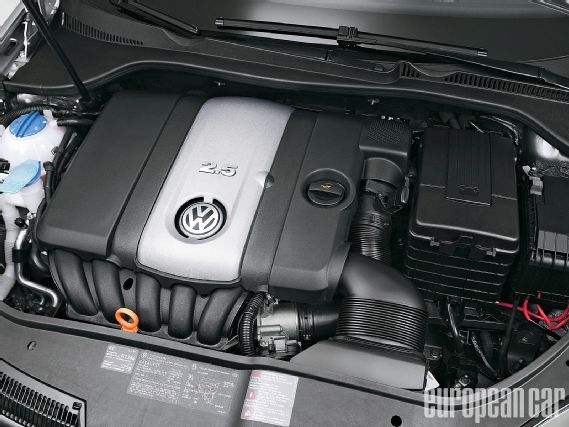 |
2010 Volkswagen Jetta 2.5L - Proven
|
2010 Volkswagen Jetta 2.5L - Proven
Performance
Temperature: 66° F
Humidity:15%
Peak Power: 133 hp @ 5976 rpm
Peak Torque: 134 lb-ft @ 3444 rpm
Test Notes
All testing was performed on the same day. All horsepower and torque numbers are quoted at the wheels. Keep in mind that the properly calibrated "Mustang" dyno produces more accurate real world numbers. While these numbers might seem low when compared to figures gathered from a Dynojet, what is important is the differences between each dyno run. When we strapped the Jetta to the dyno the needle of the fuel gauge was right at the red marks and we dynode until the fuel light appeared. All five of the Jetta's 87 octane runs were virtually identical with no major variations and at no time did the vehicle experience any knocking or pinging.
Test 1
Performance
Peak power: 138 hp @ 5908 rpm
Peak torque: 146 lb-ft @ 4060 rpm
Peak power gain: 7 hp @ 5790 rpm
Peak torque gain: 13 lb-ft @ 4150 rpm
Temperature: 67° F
Humidity: 13%
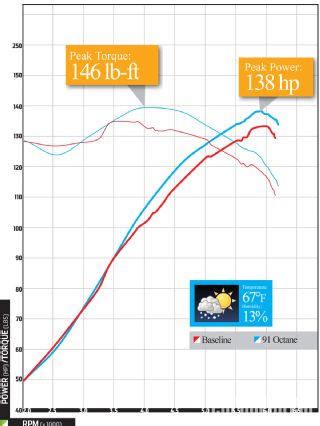 |
|
Pros
• Increase of 1-2 mpg
• Increased throttle response and smoother power transitions
• Reduce risk of knocking or pinging
• Reduce risk of horsepower loss from heat soak
Cons
• $0.20 per gallon price premium
Test Notes
We took the Jetta to a gas station about a mile away from the dyno facility and filled it up with 13.74 gallons of 91 octane gasoline. We then drove the vehicle for 25 miles to give the vehicle a chance to adapt to the octane increase and make sure there was no 87 octane left in the lines.
Test 2
Performance
Peak power: 145 hp @ 5862 rpm
Peak torque: 148 lb-ft @ 4391 rpm
Peak power gain: 8 hp @ 5744 rpm
Peak torque gain: 9 lb-ft @ 4798 rpm
Temperature: 86° F
Humidity: 29%
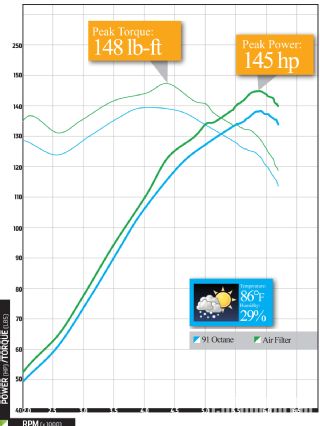 |
|
Parts: Stainless Steel bracket, silicone hose w/ billet fittings, filter, clamps, nuts and bolts
Tools: 7/16" wrench and socket, flathead and Philips screwdrivers, T20 and T25 Torx, ratchet
Installation time: 20 minutes
MSRP: $299.95
Pros
• Completely reversible in 20 minutes
• Billet EGR and air pump fittings ensure a perfect fit and seal
• Stainless Steel mounting deflects cool air from the front grill towards the air filter
• Internal velocity stack built into the base of the filter reduces turbulence and optimizes flow
• Molded silicon intake hose insures a perfect fit and seal
• Increased throttle response
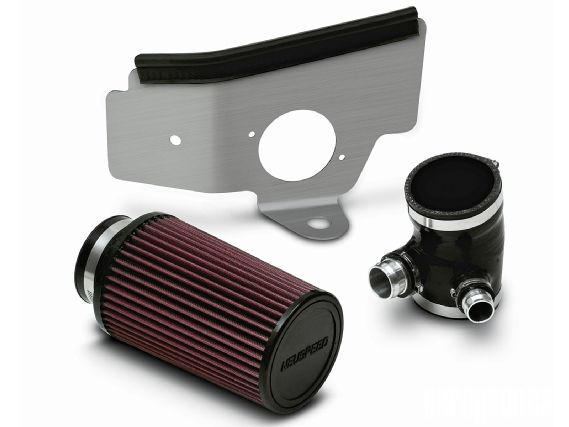 |
2010 Volkswagen Jetta 2.5L - Proven
|
2010 Volkswagen Jetta 2.5L - Proven
Cons
• Even with the intake's 50-state-legal status, your dealer still might give you a hard time
Conclusion
Does higher octane fuel make a difference on all vehicles? It did in this case. Because of VW's advanced electronics and highly adaptive engine management, the Jetta 2.5L has an elastic response to a changes in octane levels. Once we put in the 87 octane, we could feel the drop in performance-less responsive, less peppy, and overall just different. The engine instantly detected the reduced octane levels and adapted for standard performance. This analysis was based on more than 1,200 miles of driving over a week.
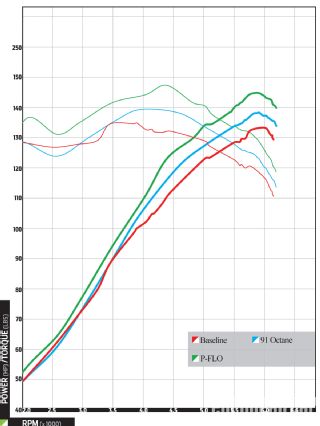 |
|
Switching between the two octanes allowed us to use the dyno to detect and confirm or refute any driving subtleties we noticed during the week. Even though the Jetta's gas tank flap advises 87 octane, the dyno graphs clearly show that running premium gasoline does have performance benefits including, a slight increase in fuel economy. In the end, you get what you pay for. If you want standard performance use standard gasoline. But if you want premium performance, pay for premium gas.
After the fuel tests, we couldn't resist adding at least one aftermarket performance part to the stocker Jetta. So we picked the most popular modification, an open-air intake. We chose Neuspeed's not only because of its steller performance reputation, but for the fact that the intake has been certified smog legal in all 50 states. The P-Flo intake took the Jetta to the next performance level by eliminating the airflow limitations in the stock airbox. Throttle response and power were significantly increased, plus the induction growl under the hood added to the sportier feel.

